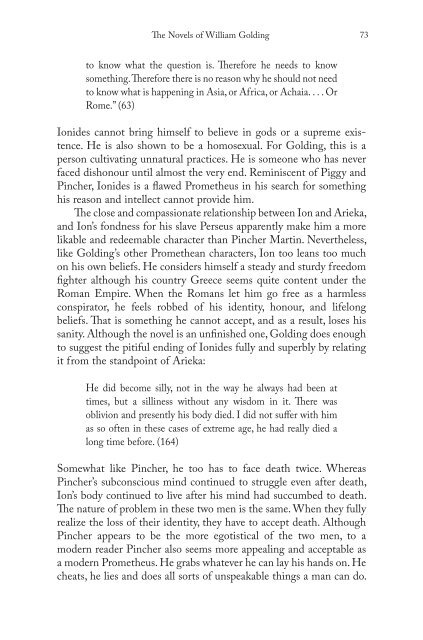Blooms Literary Themes - THE TRICKSTER.pdf - ymerleksi - home
Blooms Literary Themes - THE TRICKSTER.pdf - ymerleksi - home
Blooms Literary Themes - THE TRICKSTER.pdf - ymerleksi - home
You also want an ePaper? Increase the reach of your titles
YUMPU automatically turns print PDFs into web optimized ePapers that Google loves.
Th e Novels of William Golding 73<br />
to know what the question is. Th erefore he needs to know<br />
something. Th erefore there is no reason why he should not need<br />
to know what is happening in Asia, or Africa, or Achaia. . . . Or<br />
Rome.” (63)<br />
Ionides cannot bring himself to believe in gods or a supreme existence.<br />
He is also shown to be a homosexual. For Golding, this is a<br />
person cultivating unnatural practices. He is someone who has never<br />
faced dishonour until almost the very end. Reminiscent of Piggy and<br />
Pincher, Ionides is a fl awed Prometheus in his search for something<br />
his reason and intellect cannot provide him.<br />
Th e close and compassionate relationship between Ion and Arieka,<br />
and Ion’s fondness for his slave Perseus apparently make him a more<br />
likable and redeemable character than Pincher Martin. Nevertheless,<br />
like Golding’s other Promethean characters, Ion too leans too much<br />
on his own beliefs. He considers himself a steady and sturdy freedom<br />
fi ghter although his country Greece seems quite content under the<br />
Roman Empire. When the Romans let him go free as a harmless<br />
conspirator, he feels robbed of his identity, honour, and lifelong<br />
beliefs. Th at is something he cannot accept, and as a result, loses his<br />
sanity. Although the novel is an unfi nished one, Golding does enough<br />
to suggest the pitiful ending of Ionides fully and superbly by relating<br />
it from the standpoint of Arieka:<br />
He did become silly, not in the way he always had been at<br />
times, but a silliness without any wisdom in it. Th ere was<br />
oblivion and presently his body died. I did not suff er with him<br />
as so often in these cases of extreme age, he had really died a<br />
long time before. (164)<br />
Somewhat like Pincher, he too has to face death twice. Whereas<br />
Pincher’s subconscious mind continued to struggle even after death,<br />
Ion’s body continued to live after his mind had succumbed to death.<br />
Th e nature of problem in these two men is the same. When they fully<br />
realize the loss of their identity, they have to accept death. Although<br />
Pincher appears to be the more egotistical of the two men, to a<br />
modern reader Pincher also seems more appealing and acceptable as<br />
a modern Prometheus. He grabs whatever he can lay his hands on. He<br />
cheats, he lies and does all sorts of unspeakable things a man can do.

















